Carranza’s authorisation
On 27 December 1913 Pastor Rouaix told Carranza’s agent, Rafael Zubarán, in Hermosillo that his government had just issued paper money guarantied with future tax receipts which it reckoned it could do in the face of the normal costs of the war. However, the unexpected withdrawal from Torreón had made his government hesitate to take on responsibility for redeeming its notes without a guarantee. Zubarán replied that Carranza suggested Rouaix issue paper money which would be redeemed with a special law once order had been restored.
On 23 January 1914 Carranza, from Culiacán, authorised Rouaix to make a new issue of $1,000,000, not only for the costs of the state’s forces but also of the Constitutionalist forces operating in the neighbourhood of the state (perhaps an attempt to reconcile Rouaix’ and Arrieta’s needs)ADUR, Fondo Secretaria General de Gobierno (Siglo XX), Sección 6 Gobierno, Serie 6.7 Correspondencia, caja 7, nombre 12. On 25 January the local newspaper reported that Carranza had authorized Rouaix to issue up to a million pesos in bonos, which the national government would honour at the triumph of the revolution. The new bonos would soon be in circulationEl Demócrata, Segunda Época, Tomo II, Núm. 55, 25 January 1914: also El Demócrata, Segunda Época, Tomo II, Núm. 56, 28 January 1914. So, in the next issue, one value had a specific guarantee whilst the others had a more general, indefinite backing. These had the customary oblong shape, were dated January 1914 and had the signatures of Rouaix as Governor, Francisco Ríos Laurenzana as Secretary of State and del Real Alfaro as Director General de Rentas.
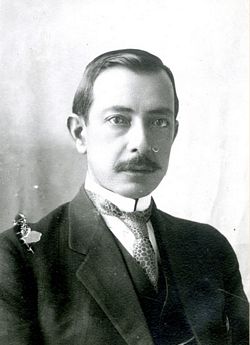
Pastor Rouaix Méndez was born in Tehuacán, Puebla, on 15 April 1875. After gaining an engineering decree he was an agricultural engineer in Durango from 1898 to 1911. He joined Madero in 1910, joined the Constitutionalists in 1913 and fought with the División del Norte. He was provisional governor of Durango from 4 July 1913 to 25 August 1914 and published an agrarian law, then Carranza’s Secretaría de Industria y Comercio from 1914 to 1917 and Secretario de Agicultura from 1917 to 1920. He accompanied Carranza in his flight to Tlaxcalantongo. He continued to be a political force nationally and in his home state after the revolution. He was the author of numerous historical and geographical books. He died on 31 December 1949. |
 |
|
Francisco Ríos Laurenzana (José Rafael Francisco de la Cruz Ríos Laurenzana) was born on 25 April 1865, in Torreón, Coahuila. In 1902 he was authorised to act as a Notario Público in Torreón. He was in a law partnership with his brother-in-law Emiliano G. Saravia, working from offices at Avenida Matamoros 37½ Directorio Comercial e Industrial de la Laguna 1905-1906, Torreón, Gómez Palacio, Lerdo, San Pedro, Viesca, Matamoros. Madero visited Durango in March 1910 and the locals formed a branch of the Partido Nacional Antireeleccionista, with Pascual Rouaix as president and Manuel del Real Alfaro, Francisco Ríos Laurenzana and Antonio Gaxiola as members of the committee. He died on 12 April 1918, in Mexico City, at the age of 52El Pueblo, Año III, Núm. 1,252, 15 April 1918. |
 |
|
Manuel del Real Alfaro was a local hacendado. He is listed as an engineer (ingeniero) in Santiago Papasquiaro in 1907Anuario Estadístico del Estado de Durango, 1907 and in 1909 he registered the Lavina gold and silver mine in GuanacevíDiario Oficial, 16 April 1909. In July 1912 he was elected as diputado suplente for Cuencamé to the federal Congress for 1912-1914El País, Año XIV, No. 3,973, 18 July 1912. In 31 May 1914 he (together with Miguel Torres, Eduardo Gámez and Jesús R. Ríos) formed the Comisión de Agricultura de la Laguna, to carry out Villista agrarian policies. Later, in 1917 he was the first secretary of the newly-formed Cámara Agrícola Nacional de la Comarca LaguneraEl Pueblo, Ano III, Núm. 944, 12 June 1917. Jesús R. Ríos was elected a board member and Antonio Rangel the comisario at the same time. and on 2 August 1936 was appointed secretary at the establishment of the Cámara Nacional Minera de TorreónThe Mining Journal, 30 August 1936. |
 |
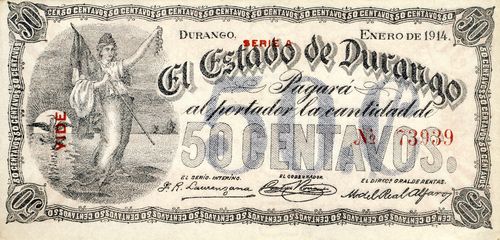
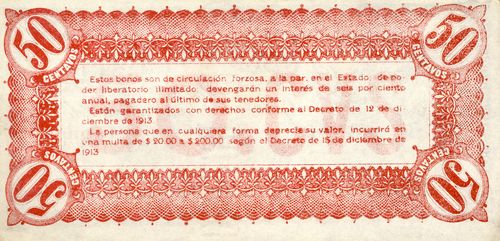 M1488a 50c Estado de Durango
M1488a 50c Estado de Durango
The legend on the back of the 50c notes originally stated that “Estos bonos son de circulación forzosa, a la par, en el Estado, de poder liberatorio ilimitado; devengarán un interés de seis por ciento annual, pagadero al último de sus tenedores. Están garantizados con derechos conforme al Decreto de 12 de diciembre de 1913. La persona que en cualquiera forma deprecie su valor, incurrirá en una multa de $20.00 a $200.00 según el Decreto de 15 de diciembre de 1913.” so they carried an annual interest of 6%, payable to the final holder, and were backed by taxes, but the interest clause was dropped and the taxes (derechos) specified as property taxes (derechos reales) on later series, in a shorter inscription.
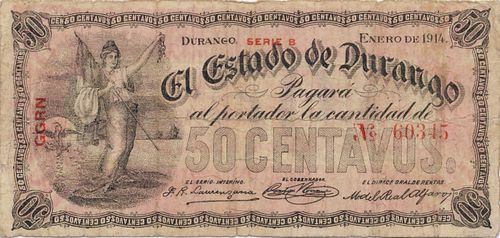
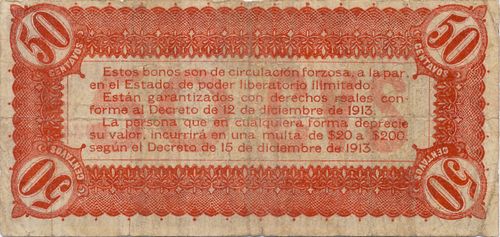 M1488b 50c Estado de Durango
M1488b 50c Estado de Durango
The $1 and $5 notes carried the magical formula that they were authorized by the Primer Jefe of the Ejército Constitucionalista (i.e. Carranza) and would be changed at par for the coins that the Constitutionalist Government would issue.
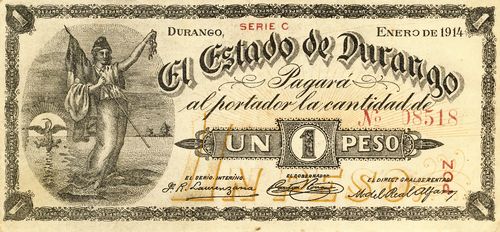
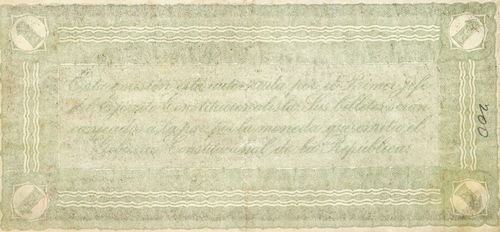 M1489a $1 Estado de Durango
M1489a $1 Estado de Durango
There are two distinct types of the $5 issue. Series A had just one signature, of Manuel del Real Alfaro, whilst the other series had three signatures, the same as the other denominations in the series. Since the December 1913 notes had just one signatures, these $5 Series A notes can be viewed as a transition piece.
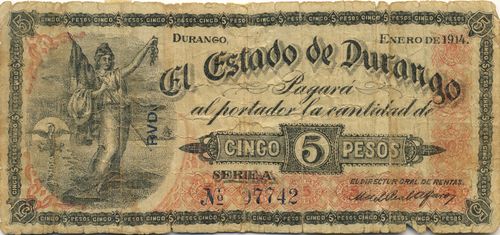
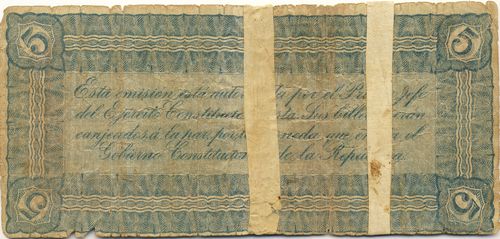
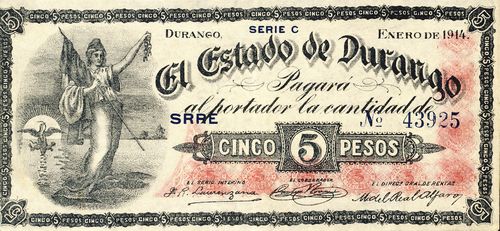
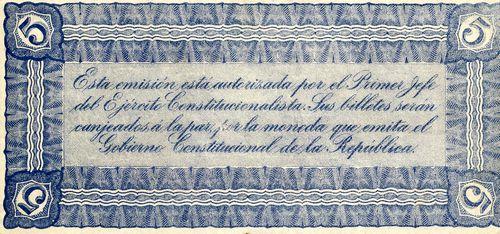 M1491a $5 Estado de Durango
M1491a $5 Estado de Durango
These seem to have been printed by Miguel Gómez as on 4 March 1914 the governor comissioned Centura Olvera to oversee the printing of bonos in the Litografía of Miguel GómezADUR, Libro Copiador 267, Hacienda 11 July 1913 - 25 April 1914, p840.
In response to a request by Pastor Rouaix, on 28 February 1914 Carranza, from his headquarters at Nogales, Sonora, made the issues that had been issued, with his approval, by the Constitutionalist governments in Sonora, Chihuahua, Sinaloa, Durango, Nuevo León and Tamaulipas forced circulation throughout the territory dominated by the Constitutionalist government. So this issue was legal currency in various states and is known revalidated by the Jefatura de Hacienda in Guadalajara, Jalisco.
On 13 May Pastor Rouaix reported to Carranza that he had issued more than the $1,000,000 authorised and was still printingADUR, Libro Copiador 279, Hacienda 25 April 1914 - 27 July 1914, p89. On 23 May Rouaix reported that he had issued $1,430,900 in bonos, and incurred costs of $1,643,000 so asked for permission to issue an additional $1,000,000 to the original $1,000,000ADUR, Libro Copiador 279, Hacienda 25 April 1914 - 27 July 1914, p139.
On 2 June Carranza, while in Durango, authorised Pastor Rouaix to issue a further $1,500,000, in addition to the original $1,000,000, to pay for his forcesPeriódico Oficial, Durango, Tomo XXXIX, Núm. 6, Durango, 7 June 1914. This was acknowledged by Rouaix on the same day (ADUR, Libro Copiador 279, Hacienda 25 April 1914 - 27 July 1914, p208). However, on 24 June Carranza’s decree was for $2,000,000. and on 26 July Carranza, from Saltillo, in decree núm. 27, confirmed the authorisation for up to $2,000,000 in notesPeriódico Oficial, Durango, Tomo XXXIX, Núm. 4, 26 July 1914. Since Rouaix’s costs had risen, on 3 August he asked for permission to issue more than the $2,000,000 authorisedADUR, Libro Copiador 280, Hacienda 28 July 1914 - 15 December 1914, p76. In the statements (corte de caja) of the Dirección General de Rentas there are references to the issue of $201,440.50 (at a cost of $975.86) in JanuaryPeriódico Oficial, Durango, Tomo XXXIX, Núm. 1, 5 July 1914 and $287,400.00 (at a cost of $886.00) in FebruaryPeriódico Oficial, Durango, Tomo XXXIX, Núm. 3, 19 July 1914.
Again, interim Director General, V. M. Castaños, later produced the following analysisPeriódico Oficial, Durango, Tomo XLI, Núm. 22, 23 April 1916.
| Series | Number | Value | |
| 50c | B | 100,000 | 50,000 |
| C | 100,000 | 50,000 | |
| $1 | A | 91,400 | 91,400 |
| B | 100,000 | 100,000 | |
| C | 100,000 | 100,000 | |
| D | 100,000 | 100,000 | |
| E | 90,000 | 90,000 | |
| F | 100,000 | 100,000 | |
| G | 100,000 | 100,000 | |
| H | 100,000 | 100,000 | |
| I | 100,000 | 100,000 | |
| J | 100,000 | 100,000 | |
| $5 | A | 96,000 | 480,000 |
| B | 100,000 | 500,000 | |
| C | 100,000 | 500,000 | |
| D | 100,000 | 500,000 | |
| $3,061,400 |
To summarise
50c notes
| Series | from | to | total number |
total value |
code letter |
|
| A | OO-CC | includes number 13200CNBanxico #3951 | ||||
| YIDE | vertical includes numbers 28061CNBanxico #3946 and 73939 |
|||||
| CDIE | includes number 64871CNBanxico #3952 | |||||
| LDIT | includes number 85668CNBanxico #3953 | |||||
| B | GGRN | vertical includes numbers 36261CNBanxico #3948 and 60345 |
||||
| L-TD | includes number 93301CNBanxico #10890 | |||||
| IBR | includes number 95325CNBanxico #3949 | |||||
| 100.000 | $ 50,000 | |||||
| C | ||||||
| 100.000 | $ 50,000 |
$1 notes
| Series | from | to | total number |
total value |
code letter |
|
| A | TGU | includes number 78083CNBanxico #3958 | ||||
| 91,400 | $ 91,400 | |||||
| B | NDN | includes number 0728CNBanxico #3961 | ||||
| AER | includes number 76014CNBanxico #3960 | |||||
| 100,000 | $100,000 | |||||
| C | POZ | vertical | ||||
| REAZ | includes number 13003CNBanxico #3962 | |||||
| 100,000 | $100,000 | |||||
| D | CI | includes number 09473CNBanxico #3963 | ||||
| ET | includes number 52199CNBanxico #10891 | |||||
| 100,000 | $100,000 | |||||
| E | vertical includes number 47761CNBanxico #3959 |
|||||
| E | SB | vertical includes number 31198CNBanxico #3964 |
||||
| 90,000 | $ 90,000 | |||||
| F | NB | includes number 29257CNBanxico #3965 | ||||
| GA | includes number 50105CNBanxico #10892 | |||||
| 100,000 | $100,000 | |||||
| G | MSLES | vertical | ||||
| DXEN | ||||||
| XRSO | includes numbers 01966CNBanxico #10893 and 37928CNBanxico #3968 | |||||
| EEVL | includes number 30983CNBanxico #3967 | |||||
| ECDO | includes number 35983 | |||||
| OIAE | includes number 68673CNBanxico #3966 | |||||
| 100,000 | $100,000 | |||||
| H | OIEEE | includes number 05596CNBanxico #3969 | ||||
| SHCNA | includes number 08795CNBanxico #10897 | |||||
| DILPU | includes number 37106CNBanxico #10894 | |||||
| SAADD | includes number 93346CNBanxico #3970 | |||||
| 100,000 | $100,000 | |||||
| I | SATO | vertical includes number 60993CNBanxico #10895 |
||||
| SEE- | includes number 92131CNBanxico #3971 | |||||
| 100,000 | $100,000 | |||||
| J | LTR | |||||
| M-ED | vertical includes number 50488CNBanxico #3974 |
|||||
| N-RL | includes numbers 55727CNBanxico #3972 and 67574CNBanxico #10896 | |||||
| 100,000 | $100,000 |
$5 notes
| Series | from | to | total number |
total value |
code letter |
|
| A | RVDJ | vertical | ||||
| EA-S-E | vertical includes number 4017CNBanxico #10899 |
|||||
| TEL-A- | ||||||
| FCLI | includes number 39262CNBanxico #3980 | |||||
| L-REL | includes number 98263CNBanxico #3979 | |||||
| 96,000 | $480.000 | |||||
| B | RE | |||||
| MAN | includes number 60627CNBanxico #3978 | |||||
| ECT- | includes number 71511CNBanxico #3990 | |||||
| O | includes number 73101CNBanxico #3981 | |||||
| DIR | includes number 92444CNBanxico #10896 | |||||
| C | SRRE | |||||
| STPET | ||||||
| TA-OFO | vertical includes numbers 14046CNBanxico #3988 and 74223CNBanxico #3983 |
|||||
| 99999 | MTL-E | includes number 97794CNBanxico #3976 | ||||
| 100,000 | $500,000 | |||||
| D | A-AJ | |||||
| IFLT | includes number 42499CNBanxico #10898 | |||||
| ESD | includes number 57903CNBanxico #3995 | |||||
| AIO | includes number 83993CNBanxico #3977 | |||||
| VRA-E | includes numbers 62412CNBanxico #3989 and 96482CNBanxico #3982 | |||||
| ENE | includes number 74505CNBanxico #3986 | |||||
| RVN | includes number 89401CNBanxico #3987 | |||||
| 100,000 | $500,000 |
On 8 June 1915 Gaxiola told Nícolas Espinosa, the jefe político of Cuencamé, that so far no counterfeits of the Rouaix 50c, $1 or $5 had appearedADUR, Fondo Secretaría General de Gobierno, Sección Siglo XIX, Serie Correspondencia, Subserie Revolución, gaveta 6, nombre 88 and ADUR, Libro Copiador 304, Hacienda 20 May 1915 - 1 March 1916, p43.
